Nursing: Diabetes and Hypertension
VerifiedAdded on 2023/04/21
|9
|1779
|446
AI Summary
This article discusses the importance of nursing in managing diabetes and hypertension, including the background, importance to nursing, and findings related to these conditions.
Contribute Materials
Your contribution can guide someone’s learning journey. Share your
documents today.
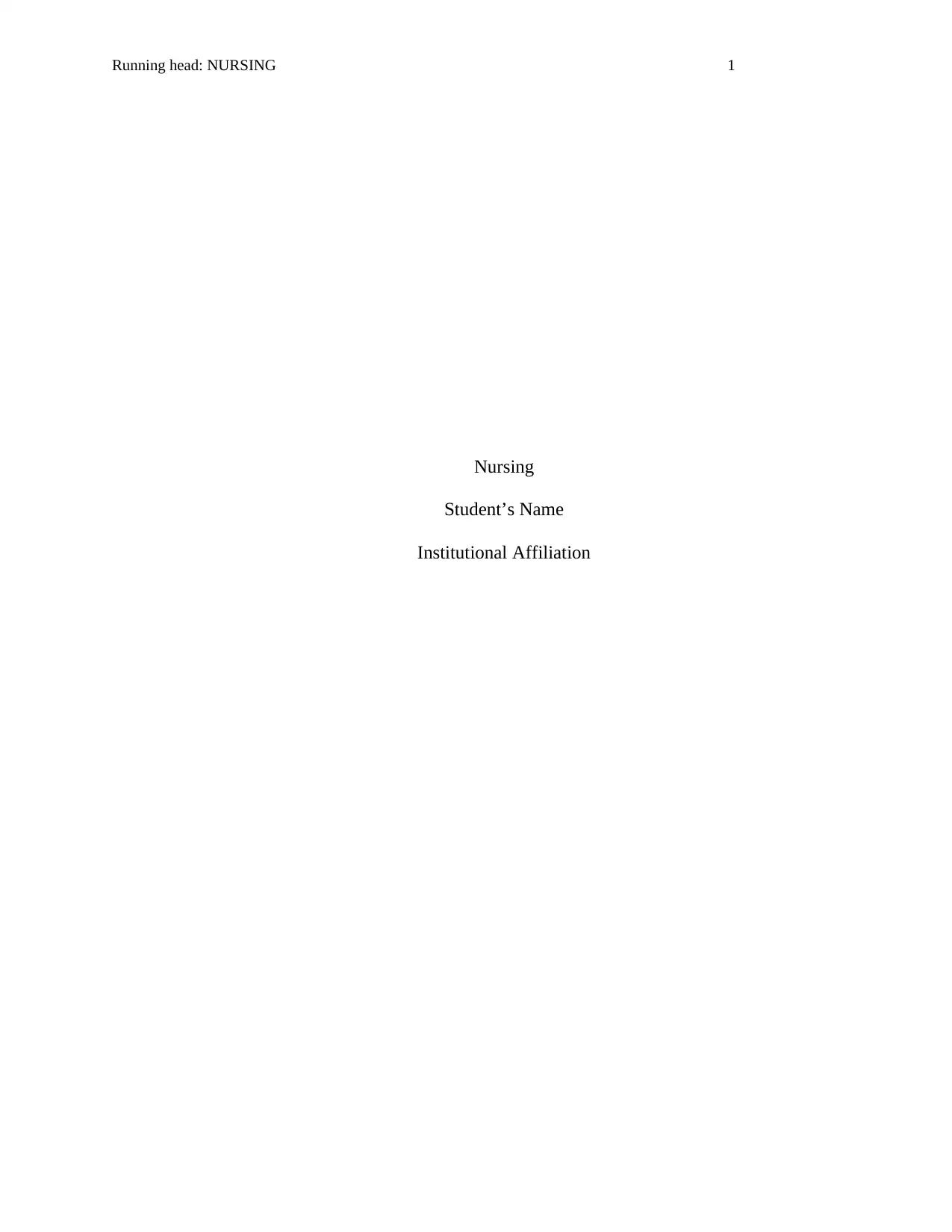
Running head: NURSING 1
Nursing
Student’s Name
Institutional Affiliation
Nursing
Student’s Name
Institutional Affiliation
Secure Best Marks with AI Grader
Need help grading? Try our AI Grader for instant feedback on your assignments.
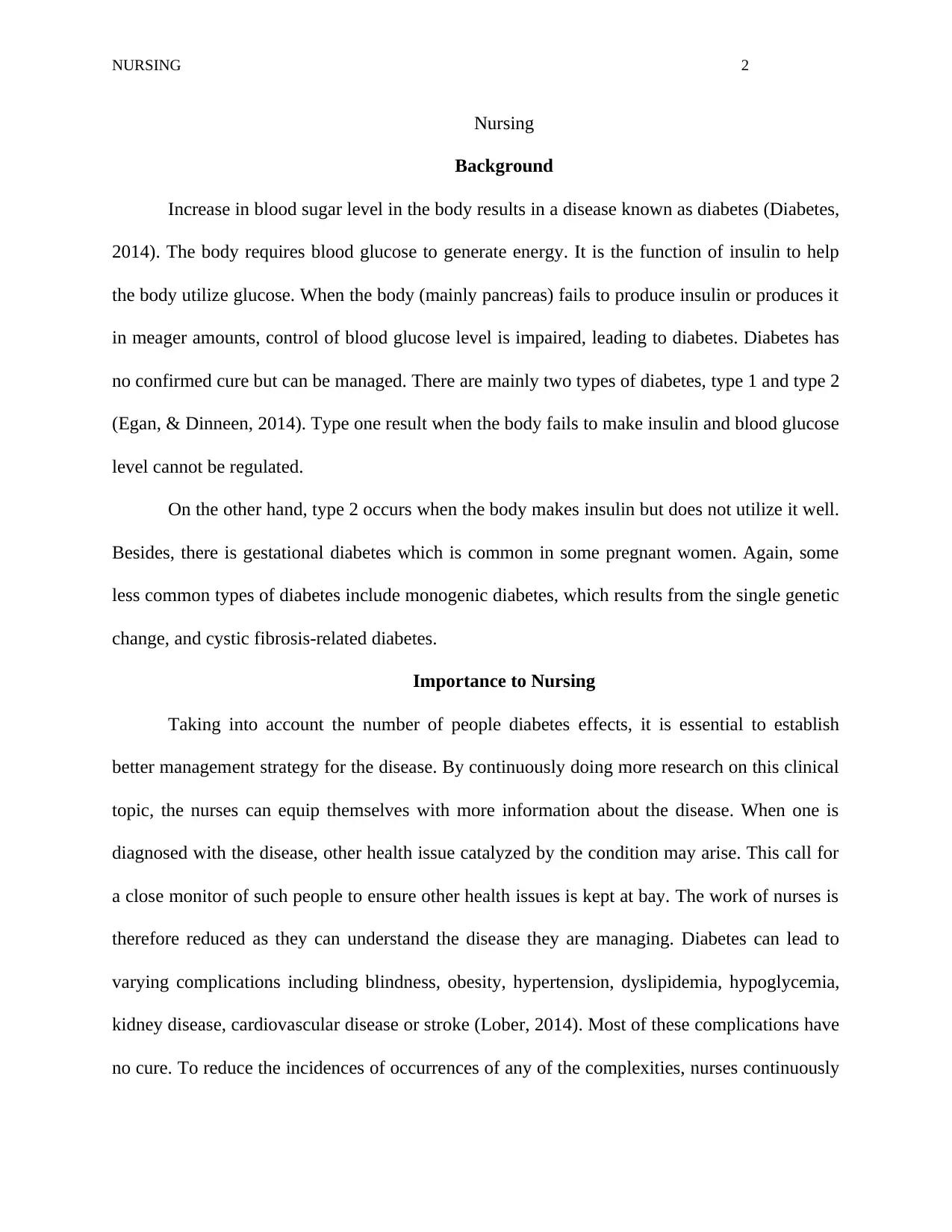
NURSING 2
Nursing
Background
Increase in blood sugar level in the body results in a disease known as diabetes (Diabetes,
2014). The body requires blood glucose to generate energy. It is the function of insulin to help
the body utilize glucose. When the body (mainly pancreas) fails to produce insulin or produces it
in meager amounts, control of blood glucose level is impaired, leading to diabetes. Diabetes has
no confirmed cure but can be managed. There are mainly two types of diabetes, type 1 and type 2
(Egan, & Dinneen, 2014). Type one result when the body fails to make insulin and blood glucose
level cannot be regulated.
On the other hand, type 2 occurs when the body makes insulin but does not utilize it well.
Besides, there is gestational diabetes which is common in some pregnant women. Again, some
less common types of diabetes include monogenic diabetes, which results from the single genetic
change, and cystic fibrosis-related diabetes.
Importance to Nursing
Taking into account the number of people diabetes effects, it is essential to establish
better management strategy for the disease. By continuously doing more research on this clinical
topic, the nurses can equip themselves with more information about the disease. When one is
diagnosed with the disease, other health issue catalyzed by the condition may arise. This call for
a close monitor of such people to ensure other health issues is kept at bay. The work of nurses is
therefore reduced as they can understand the disease they are managing. Diabetes can lead to
varying complications including blindness, obesity, hypertension, dyslipidemia, hypoglycemia,
kidney disease, cardiovascular disease or stroke (Lober, 2014). Most of these complications have
no cure. To reduce the incidences of occurrences of any of the complexities, nurses continuously
Nursing
Background
Increase in blood sugar level in the body results in a disease known as diabetes (Diabetes,
2014). The body requires blood glucose to generate energy. It is the function of insulin to help
the body utilize glucose. When the body (mainly pancreas) fails to produce insulin or produces it
in meager amounts, control of blood glucose level is impaired, leading to diabetes. Diabetes has
no confirmed cure but can be managed. There are mainly two types of diabetes, type 1 and type 2
(Egan, & Dinneen, 2014). Type one result when the body fails to make insulin and blood glucose
level cannot be regulated.
On the other hand, type 2 occurs when the body makes insulin but does not utilize it well.
Besides, there is gestational diabetes which is common in some pregnant women. Again, some
less common types of diabetes include monogenic diabetes, which results from the single genetic
change, and cystic fibrosis-related diabetes.
Importance to Nursing
Taking into account the number of people diabetes effects, it is essential to establish
better management strategy for the disease. By continuously doing more research on this clinical
topic, the nurses can equip themselves with more information about the disease. When one is
diagnosed with the disease, other health issue catalyzed by the condition may arise. This call for
a close monitor of such people to ensure other health issues is kept at bay. The work of nurses is
therefore reduced as they can understand the disease they are managing. Diabetes can lead to
varying complications including blindness, obesity, hypertension, dyslipidemia, hypoglycemia,
kidney disease, cardiovascular disease or stroke (Lober, 2014). Most of these complications have
no cure. To reduce the incidences of occurrences of any of the complexities, nurses continuously
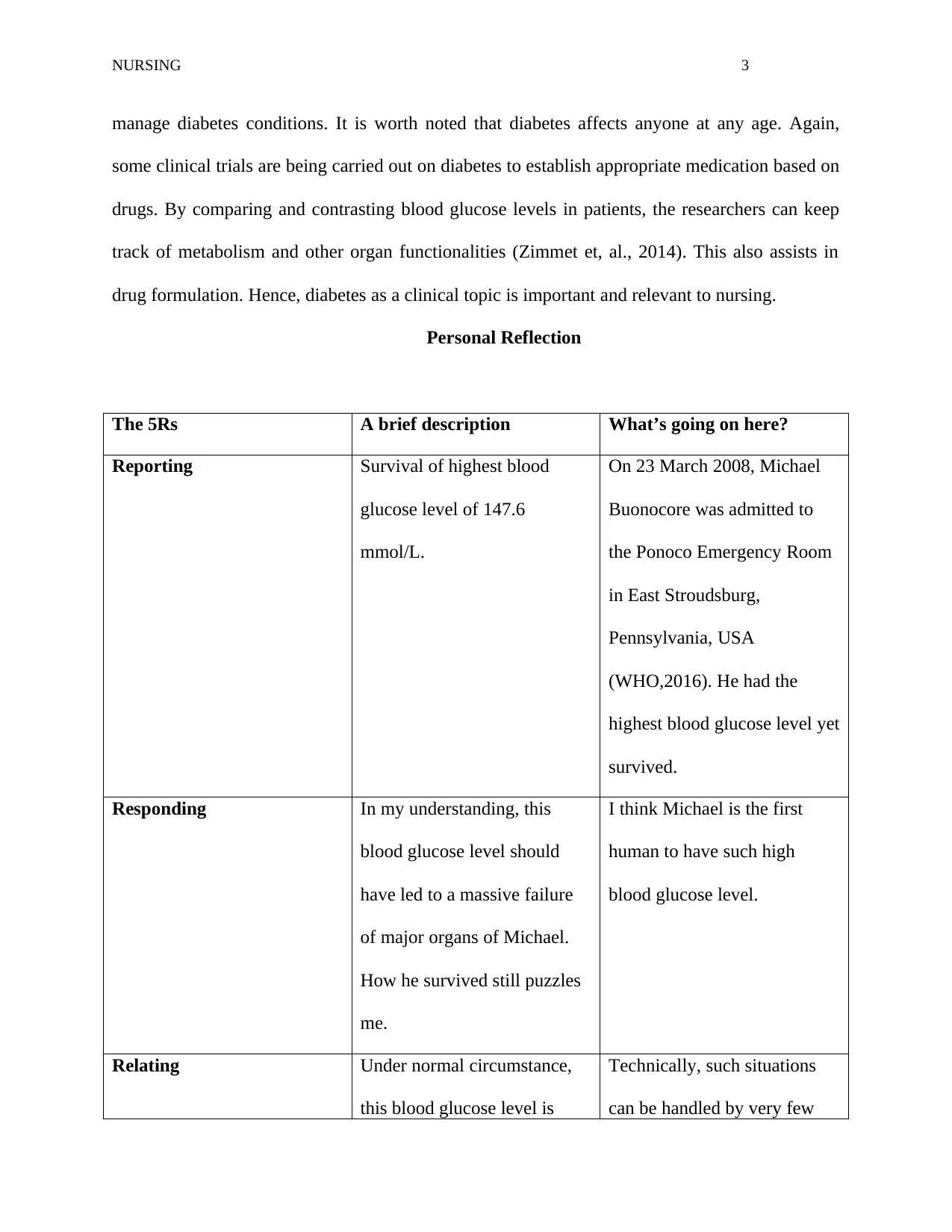
NURSING 3
manage diabetes conditions. It is worth noted that diabetes affects anyone at any age. Again,
some clinical trials are being carried out on diabetes to establish appropriate medication based on
drugs. By comparing and contrasting blood glucose levels in patients, the researchers can keep
track of metabolism and other organ functionalities (Zimmet et, al., 2014). This also assists in
drug formulation. Hence, diabetes as a clinical topic is important and relevant to nursing.
Personal Reflection
The 5Rs A brief description What’s going on here?
Reporting Survival of highest blood
glucose level of 147.6
mmol/L.
On 23 March 2008, Michael
Buonocore was admitted to
the Ponoco Emergency Room
in East Stroudsburg,
Pennsylvania, USA
(WHO,2016). He had the
highest blood glucose level yet
survived.
Responding In my understanding, this
blood glucose level should
have led to a massive failure
of major organs of Michael.
How he survived still puzzles
me.
I think Michael is the first
human to have such high
blood glucose level.
Relating Under normal circumstance,
this blood glucose level is
Technically, such situations
can be handled by very few
manage diabetes conditions. It is worth noted that diabetes affects anyone at any age. Again,
some clinical trials are being carried out on diabetes to establish appropriate medication based on
drugs. By comparing and contrasting blood glucose levels in patients, the researchers can keep
track of metabolism and other organ functionalities (Zimmet et, al., 2014). This also assists in
drug formulation. Hence, diabetes as a clinical topic is important and relevant to nursing.
Personal Reflection
The 5Rs A brief description What’s going on here?
Reporting Survival of highest blood
glucose level of 147.6
mmol/L.
On 23 March 2008, Michael
Buonocore was admitted to
the Ponoco Emergency Room
in East Stroudsburg,
Pennsylvania, USA
(WHO,2016). He had the
highest blood glucose level yet
survived.
Responding In my understanding, this
blood glucose level should
have led to a massive failure
of major organs of Michael.
How he survived still puzzles
me.
I think Michael is the first
human to have such high
blood glucose level.
Relating Under normal circumstance,
this blood glucose level is
Technically, such situations
can be handled by very few
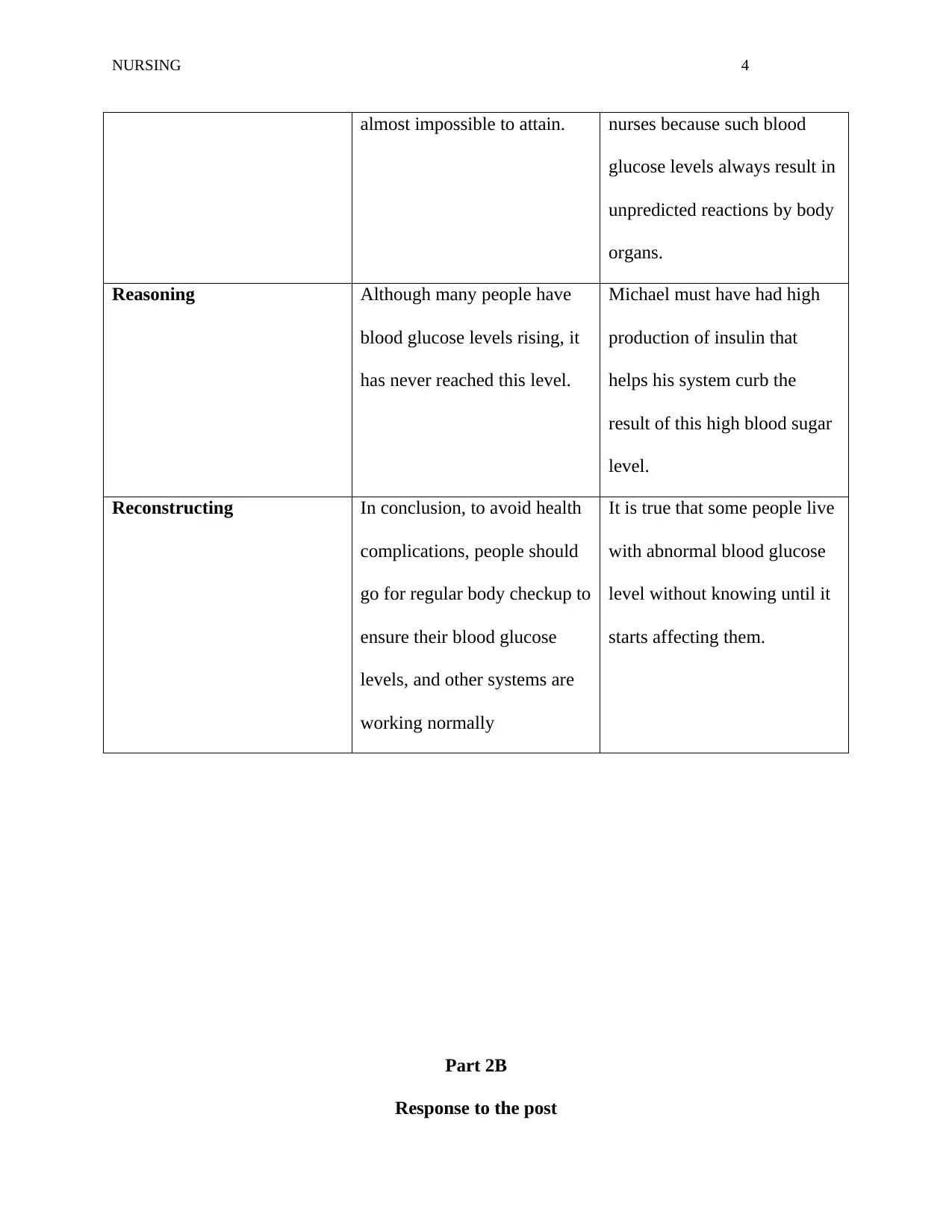
NURSING 4
almost impossible to attain. nurses because such blood
glucose levels always result in
unpredicted reactions by body
organs.
Reasoning Although many people have
blood glucose levels rising, it
has never reached this level.
Michael must have had high
production of insulin that
helps his system curb the
result of this high blood sugar
level.
Reconstructing In conclusion, to avoid health
complications, people should
go for regular body checkup to
ensure their blood glucose
levels, and other systems are
working normally
It is true that some people live
with abnormal blood glucose
level without knowing until it
starts affecting them.
Part 2B
Response to the post
almost impossible to attain. nurses because such blood
glucose levels always result in
unpredicted reactions by body
organs.
Reasoning Although many people have
blood glucose levels rising, it
has never reached this level.
Michael must have had high
production of insulin that
helps his system curb the
result of this high blood sugar
level.
Reconstructing In conclusion, to avoid health
complications, people should
go for regular body checkup to
ensure their blood glucose
levels, and other systems are
working normally
It is true that some people live
with abnormal blood glucose
level without knowing until it
starts affecting them.
Part 2B
Response to the post
Paraphrase This Document
Need a fresh take? Get an instant paraphrase of this document with our AI Paraphraser
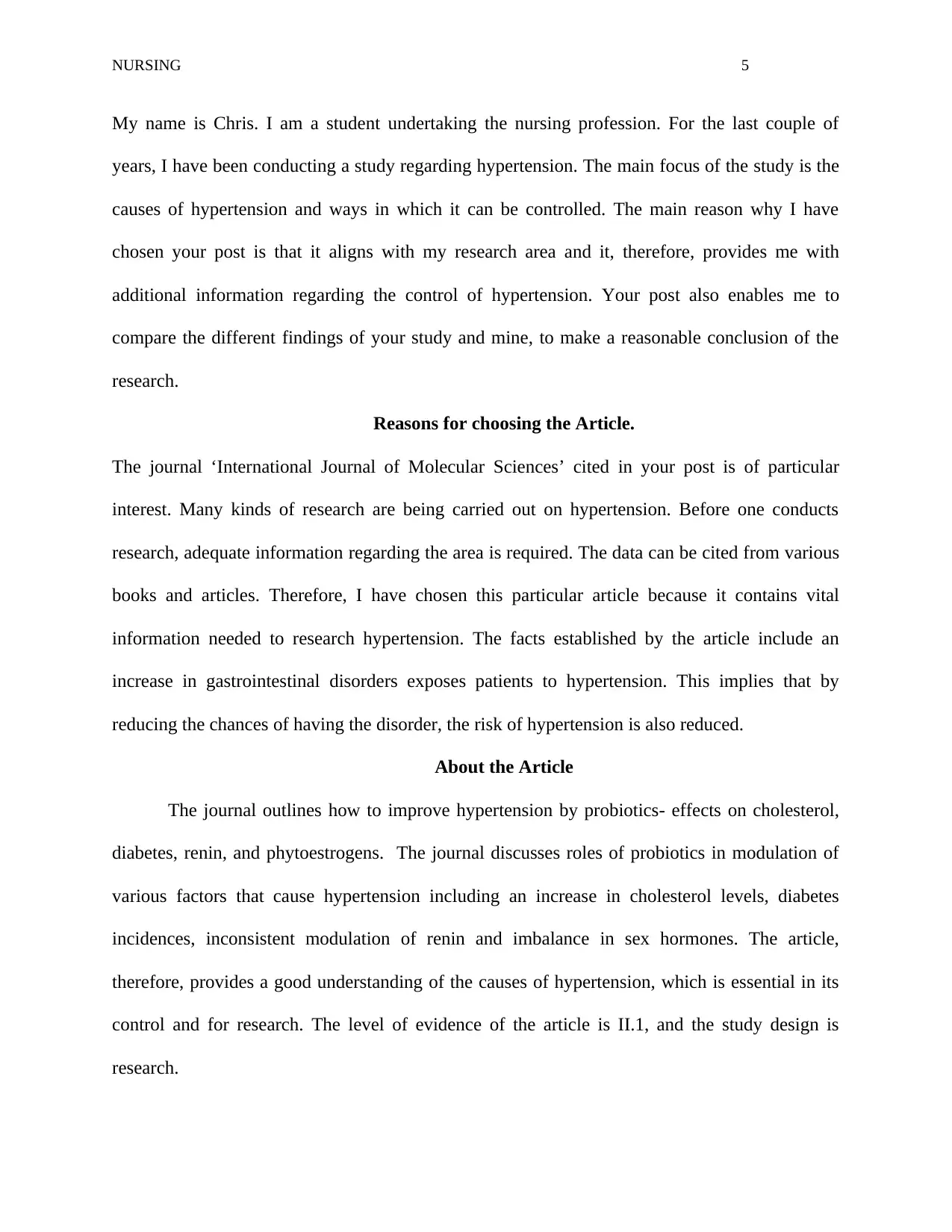
NURSING 5
My name is Chris. I am a student undertaking the nursing profession. For the last couple of
years, I have been conducting a study regarding hypertension. The main focus of the study is the
causes of hypertension and ways in which it can be controlled. The main reason why I have
chosen your post is that it aligns with my research area and it, therefore, provides me with
additional information regarding the control of hypertension. Your post also enables me to
compare the different findings of your study and mine, to make a reasonable conclusion of the
research.
Reasons for choosing the Article.
The journal ‘International Journal of Molecular Sciences’ cited in your post is of particular
interest. Many kinds of research are being carried out on hypertension. Before one conducts
research, adequate information regarding the area is required. The data can be cited from various
books and articles. Therefore, I have chosen this particular article because it contains vital
information needed to research hypertension. The facts established by the article include an
increase in gastrointestinal disorders exposes patients to hypertension. This implies that by
reducing the chances of having the disorder, the risk of hypertension is also reduced.
About the Article
The journal outlines how to improve hypertension by probiotics- effects on cholesterol,
diabetes, renin, and phytoestrogens. The journal discusses roles of probiotics in modulation of
various factors that cause hypertension including an increase in cholesterol levels, diabetes
incidences, inconsistent modulation of renin and imbalance in sex hormones. The article,
therefore, provides a good understanding of the causes of hypertension, which is essential in its
control and for research. The level of evidence of the article is II.1, and the study design is
research.
My name is Chris. I am a student undertaking the nursing profession. For the last couple of
years, I have been conducting a study regarding hypertension. The main focus of the study is the
causes of hypertension and ways in which it can be controlled. The main reason why I have
chosen your post is that it aligns with my research area and it, therefore, provides me with
additional information regarding the control of hypertension. Your post also enables me to
compare the different findings of your study and mine, to make a reasonable conclusion of the
research.
Reasons for choosing the Article.
The journal ‘International Journal of Molecular Sciences’ cited in your post is of particular
interest. Many kinds of research are being carried out on hypertension. Before one conducts
research, adequate information regarding the area is required. The data can be cited from various
books and articles. Therefore, I have chosen this particular article because it contains vital
information needed to research hypertension. The facts established by the article include an
increase in gastrointestinal disorders exposes patients to hypertension. This implies that by
reducing the chances of having the disorder, the risk of hypertension is also reduced.
About the Article
The journal outlines how to improve hypertension by probiotics- effects on cholesterol,
diabetes, renin, and phytoestrogens. The journal discusses roles of probiotics in modulation of
various factors that cause hypertension including an increase in cholesterol levels, diabetes
incidences, inconsistent modulation of renin and imbalance in sex hormones. The article,
therefore, provides a good understanding of the causes of hypertension, which is essential in its
control and for research. The level of evidence of the article is II.1, and the study design is
research.
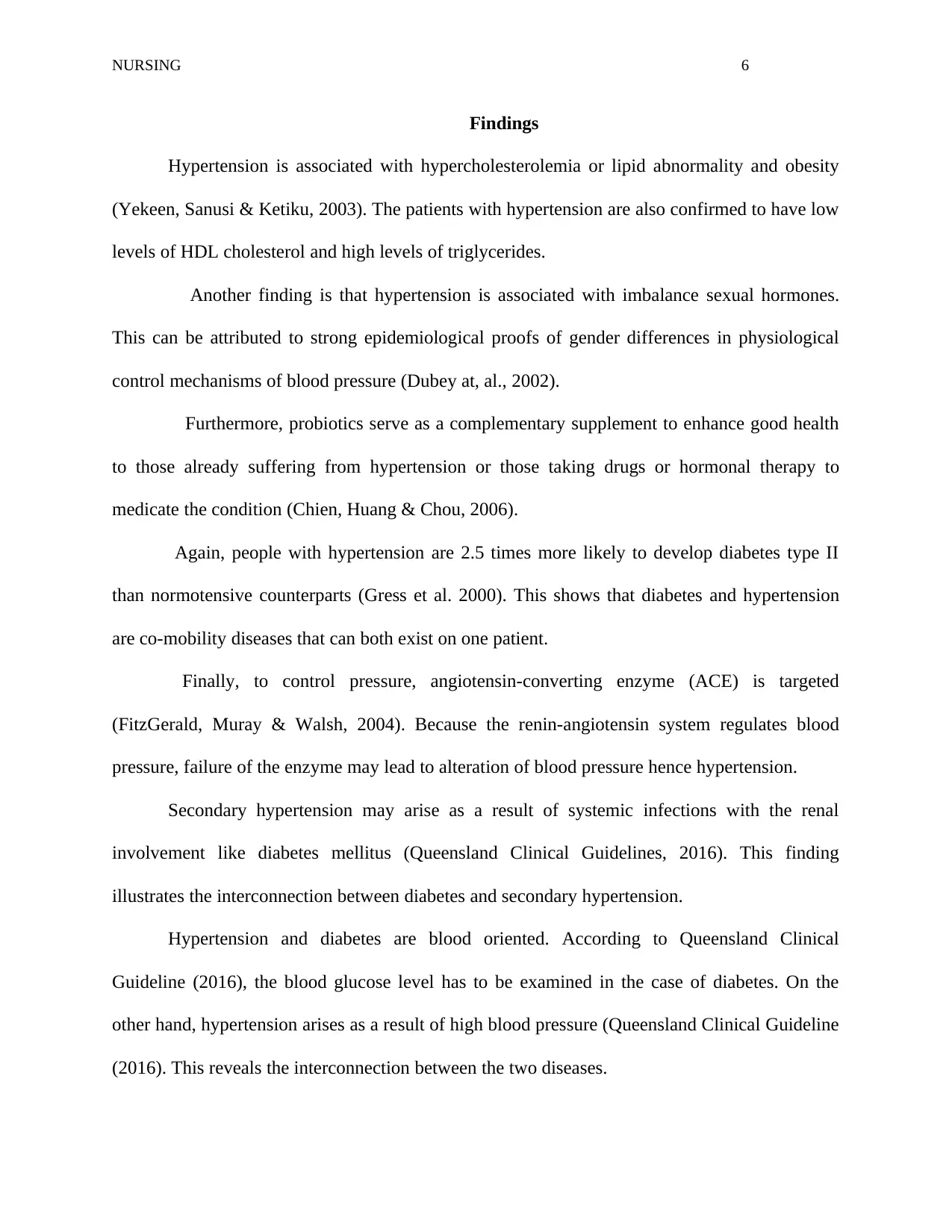
NURSING 6
Findings
Hypertension is associated with hypercholesterolemia or lipid abnormality and obesity
(Yekeen, Sanusi & Ketiku, 2003). The patients with hypertension are also confirmed to have low
levels of HDL cholesterol and high levels of triglycerides.
Another finding is that hypertension is associated with imbalance sexual hormones.
This can be attributed to strong epidemiological proofs of gender differences in physiological
control mechanisms of blood pressure (Dubey at, al., 2002).
Furthermore, probiotics serve as a complementary supplement to enhance good health
to those already suffering from hypertension or those taking drugs or hormonal therapy to
medicate the condition (Chien, Huang & Chou, 2006).
Again, people with hypertension are 2.5 times more likely to develop diabetes type II
than normotensive counterparts (Gress et al. 2000). This shows that diabetes and hypertension
are co-mobility diseases that can both exist on one patient.
Finally, to control pressure, angiotensin-converting enzyme (ACE) is targeted
(FitzGerald, Muray & Walsh, 2004). Because the renin-angiotensin system regulates blood
pressure, failure of the enzyme may lead to alteration of blood pressure hence hypertension.
Secondary hypertension may arise as a result of systemic infections with the renal
involvement like diabetes mellitus (Queensland Clinical Guidelines, 2016). This finding
illustrates the interconnection between diabetes and secondary hypertension.
Hypertension and diabetes are blood oriented. According to Queensland Clinical
Guideline (2016), the blood glucose level has to be examined in the case of diabetes. On the
other hand, hypertension arises as a result of high blood pressure (Queensland Clinical Guideline
(2016). This reveals the interconnection between the two diseases.
Findings
Hypertension is associated with hypercholesterolemia or lipid abnormality and obesity
(Yekeen, Sanusi & Ketiku, 2003). The patients with hypertension are also confirmed to have low
levels of HDL cholesterol and high levels of triglycerides.
Another finding is that hypertension is associated with imbalance sexual hormones.
This can be attributed to strong epidemiological proofs of gender differences in physiological
control mechanisms of blood pressure (Dubey at, al., 2002).
Furthermore, probiotics serve as a complementary supplement to enhance good health
to those already suffering from hypertension or those taking drugs or hormonal therapy to
medicate the condition (Chien, Huang & Chou, 2006).
Again, people with hypertension are 2.5 times more likely to develop diabetes type II
than normotensive counterparts (Gress et al. 2000). This shows that diabetes and hypertension
are co-mobility diseases that can both exist on one patient.
Finally, to control pressure, angiotensin-converting enzyme (ACE) is targeted
(FitzGerald, Muray & Walsh, 2004). Because the renin-angiotensin system regulates blood
pressure, failure of the enzyme may lead to alteration of blood pressure hence hypertension.
Secondary hypertension may arise as a result of systemic infections with the renal
involvement like diabetes mellitus (Queensland Clinical Guidelines, 2016). This finding
illustrates the interconnection between diabetes and secondary hypertension.
Hypertension and diabetes are blood oriented. According to Queensland Clinical
Guideline (2016), the blood glucose level has to be examined in the case of diabetes. On the
other hand, hypertension arises as a result of high blood pressure (Queensland Clinical Guideline
(2016). This reveals the interconnection between the two diseases.
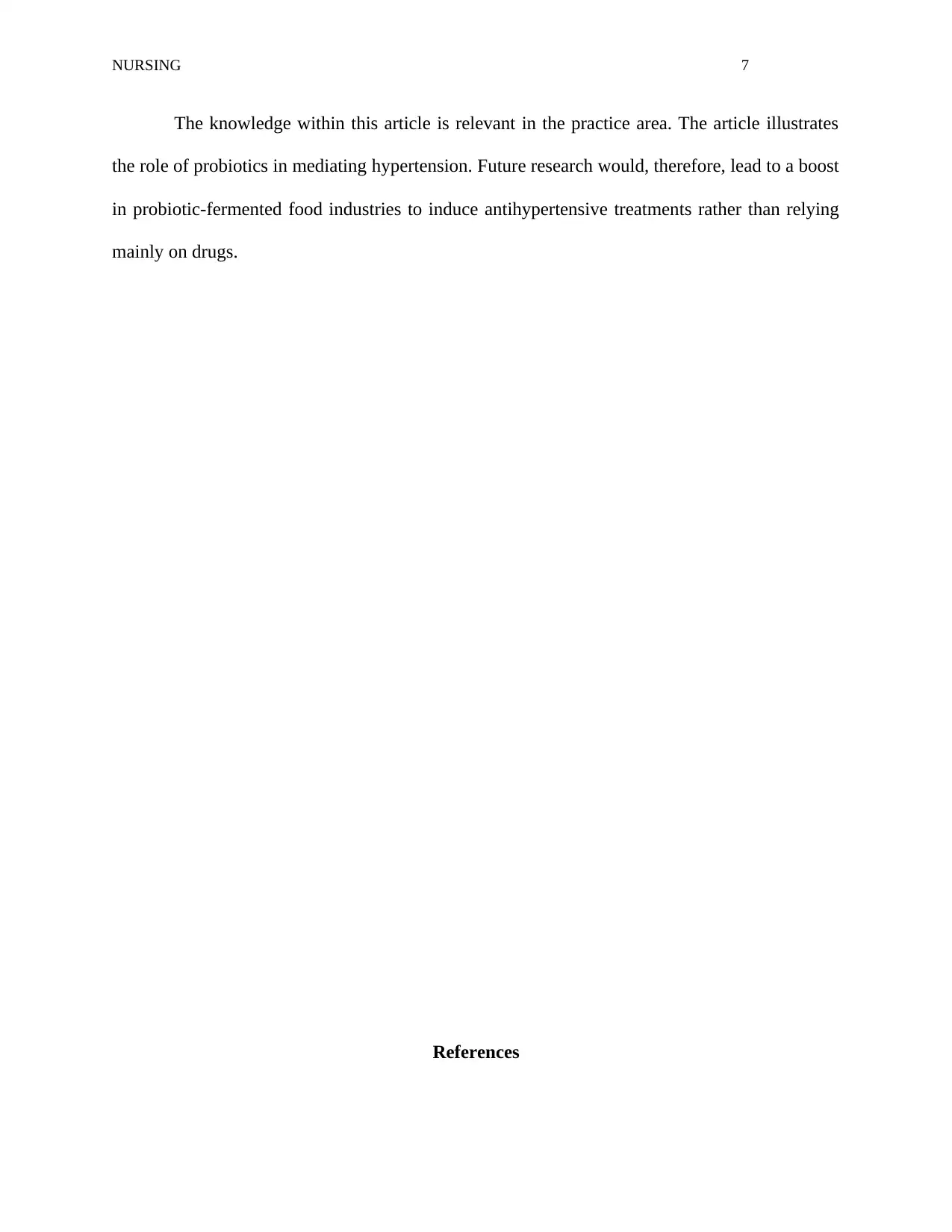
NURSING 7
The knowledge within this article is relevant in the practice area. The article illustrates
the role of probiotics in mediating hypertension. Future research would, therefore, lead to a boost
in probiotic-fermented food industries to induce antihypertensive treatments rather than relying
mainly on drugs.
References
The knowledge within this article is relevant in the practice area. The article illustrates
the role of probiotics in mediating hypertension. Future research would, therefore, lead to a boost
in probiotic-fermented food industries to induce antihypertensive treatments rather than relying
mainly on drugs.
References
Secure Best Marks with AI Grader
Need help grading? Try our AI Grader for instant feedback on your assignments.
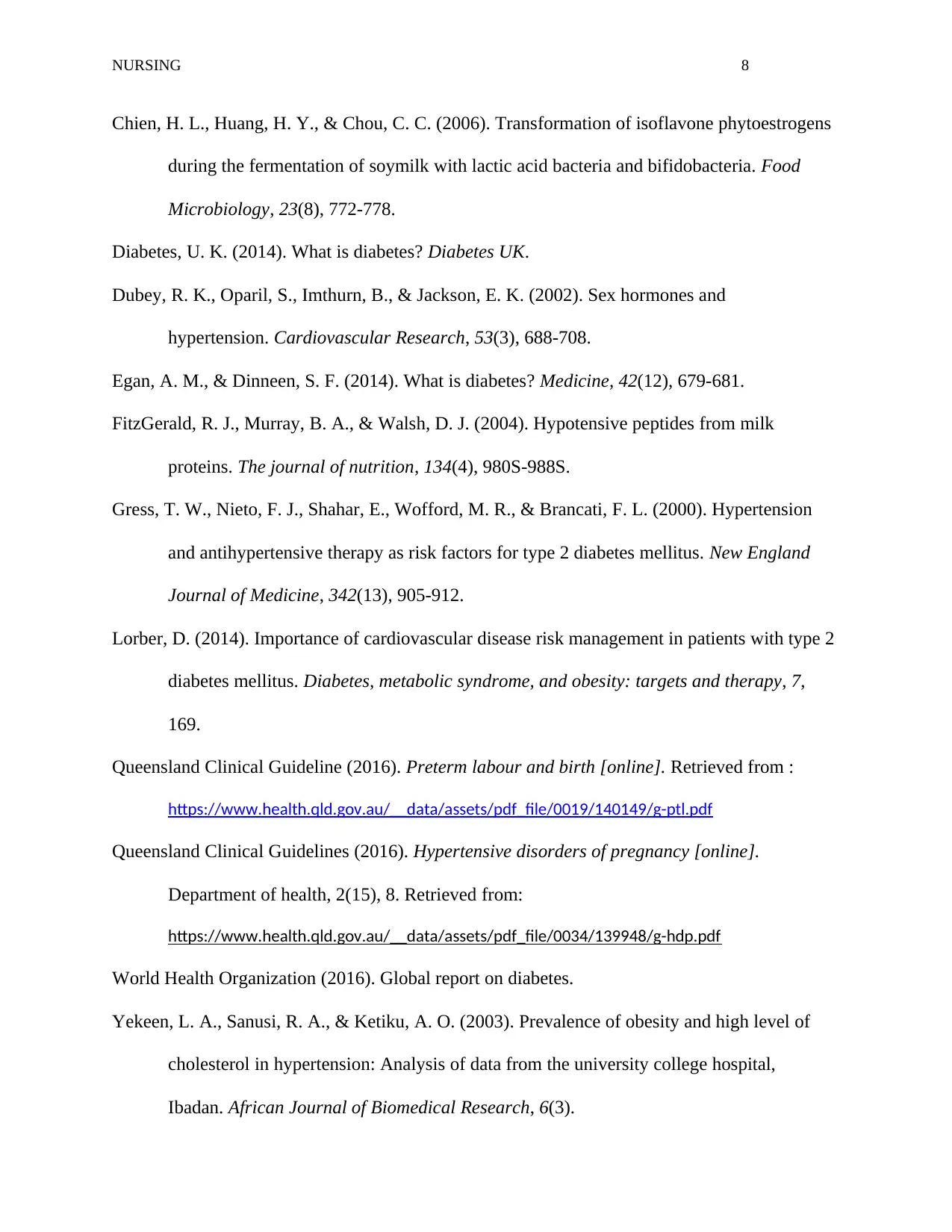
NURSING 8
Chien, H. L., Huang, H. Y., & Chou, C. C. (2006). Transformation of isoflavone phytoestrogens
during the fermentation of soymilk with lactic acid bacteria and bifidobacteria. Food
Microbiology, 23(8), 772-778.
Diabetes, U. K. (2014). What is diabetes? Diabetes UK.
Dubey, R. K., Oparil, S., Imthurn, B., & Jackson, E. K. (2002). Sex hormones and
hypertension. Cardiovascular Research, 53(3), 688-708.
Egan, A. M., & Dinneen, S. F. (2014). What is diabetes? Medicine, 42(12), 679-681.
FitzGerald, R. J., Murray, B. A., & Walsh, D. J. (2004). Hypotensive peptides from milk
proteins. The journal of nutrition, 134(4), 980S-988S.
Gress, T. W., Nieto, F. J., Shahar, E., Wofford, M. R., & Brancati, F. L. (2000). Hypertension
and antihypertensive therapy as risk factors for type 2 diabetes mellitus. New England
Journal of Medicine, 342(13), 905-912.
Lorber, D. (2014). Importance of cardiovascular disease risk management in patients with type 2
diabetes mellitus. Diabetes, metabolic syndrome, and obesity: targets and therapy, 7,
169.
Queensland Clinical Guideline (2016). Preterm labour and birth [online]. Retrieved from :
https://www.health.qld.gov.au/__data/assets/pdf_file/0019/140149/g-ptl.pdf
Queensland Clinical Guidelines (2016). Hypertensive disorders of pregnancy [online].
Department of health, 2(15), 8. Retrieved from:
https://www.health.qld.gov.au/__data/assets/pdf_file/0034/139948/g-hdp.pdf
World Health Organization (2016). Global report on diabetes.
Yekeen, L. A., Sanusi, R. A., & Ketiku, A. O. (2003). Prevalence of obesity and high level of
cholesterol in hypertension: Analysis of data from the university college hospital,
Ibadan. African Journal of Biomedical Research, 6(3).
Chien, H. L., Huang, H. Y., & Chou, C. C. (2006). Transformation of isoflavone phytoestrogens
during the fermentation of soymilk with lactic acid bacteria and bifidobacteria. Food
Microbiology, 23(8), 772-778.
Diabetes, U. K. (2014). What is diabetes? Diabetes UK.
Dubey, R. K., Oparil, S., Imthurn, B., & Jackson, E. K. (2002). Sex hormones and
hypertension. Cardiovascular Research, 53(3), 688-708.
Egan, A. M., & Dinneen, S. F. (2014). What is diabetes? Medicine, 42(12), 679-681.
FitzGerald, R. J., Murray, B. A., & Walsh, D. J. (2004). Hypotensive peptides from milk
proteins. The journal of nutrition, 134(4), 980S-988S.
Gress, T. W., Nieto, F. J., Shahar, E., Wofford, M. R., & Brancati, F. L. (2000). Hypertension
and antihypertensive therapy as risk factors for type 2 diabetes mellitus. New England
Journal of Medicine, 342(13), 905-912.
Lorber, D. (2014). Importance of cardiovascular disease risk management in patients with type 2
diabetes mellitus. Diabetes, metabolic syndrome, and obesity: targets and therapy, 7,
169.
Queensland Clinical Guideline (2016). Preterm labour and birth [online]. Retrieved from :
https://www.health.qld.gov.au/__data/assets/pdf_file/0019/140149/g-ptl.pdf
Queensland Clinical Guidelines (2016). Hypertensive disorders of pregnancy [online].
Department of health, 2(15), 8. Retrieved from:
https://www.health.qld.gov.au/__data/assets/pdf_file/0034/139948/g-hdp.pdf
World Health Organization (2016). Global report on diabetes.
Yekeen, L. A., Sanusi, R. A., & Ketiku, A. O. (2003). Prevalence of obesity and high level of
cholesterol in hypertension: Analysis of data from the university college hospital,
Ibadan. African Journal of Biomedical Research, 6(3).
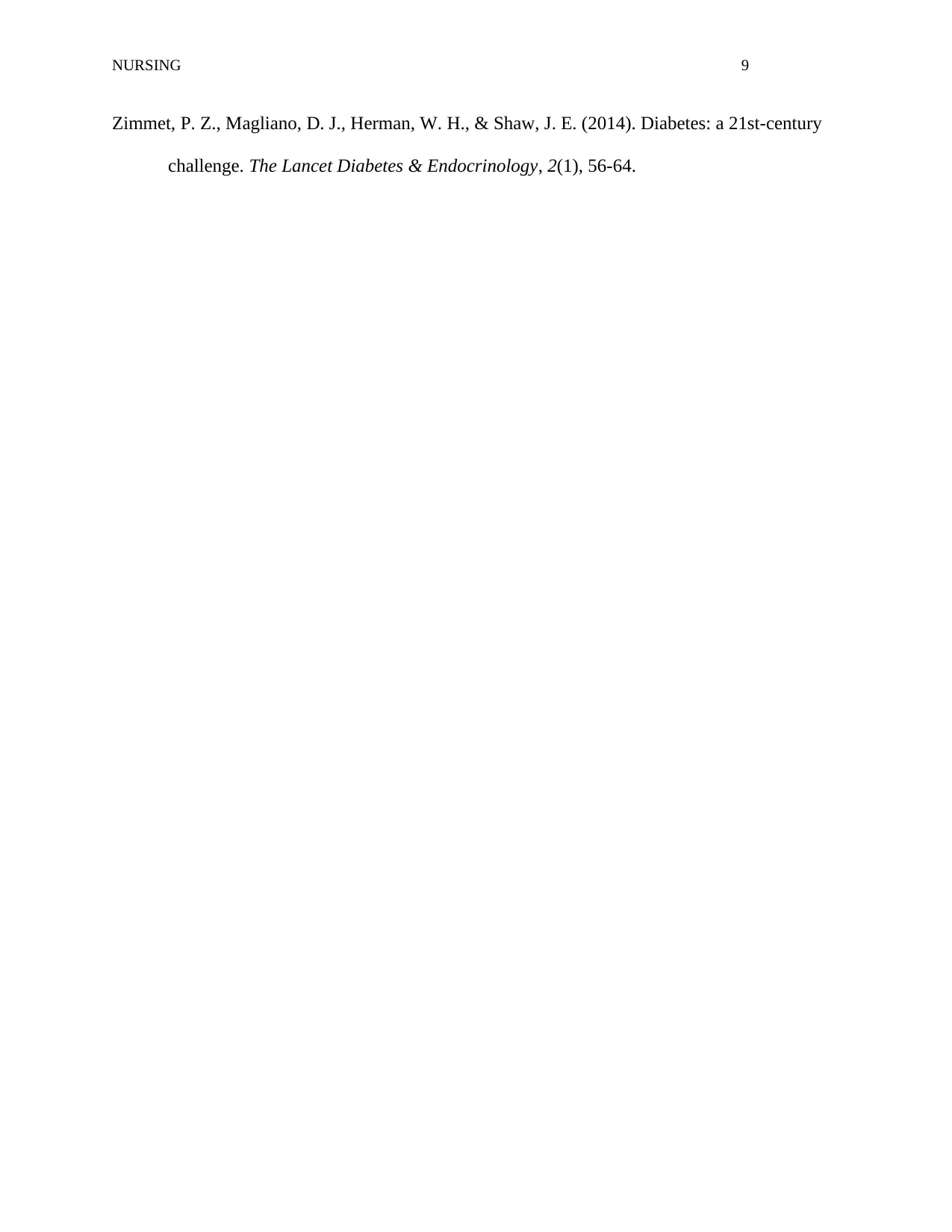
NURSING 9
Zimmet, P. Z., Magliano, D. J., Herman, W. H., & Shaw, J. E. (2014). Diabetes: a 21st-century
challenge. The Lancet Diabetes & Endocrinology, 2(1), 56-64.
Zimmet, P. Z., Magliano, D. J., Herman, W. H., & Shaw, J. E. (2014). Diabetes: a 21st-century
challenge. The Lancet Diabetes & Endocrinology, 2(1), 56-64.
1 out of 9
Related Documents
Your All-in-One AI-Powered Toolkit for Academic Success.
+13062052269
info@desklib.com
Available 24*7 on WhatsApp / Email
![[object Object]](/_next/static/media/star-bottom.7253800d.svg)
Unlock your academic potential
© 2024 | Zucol Services PVT LTD | All rights reserved.





